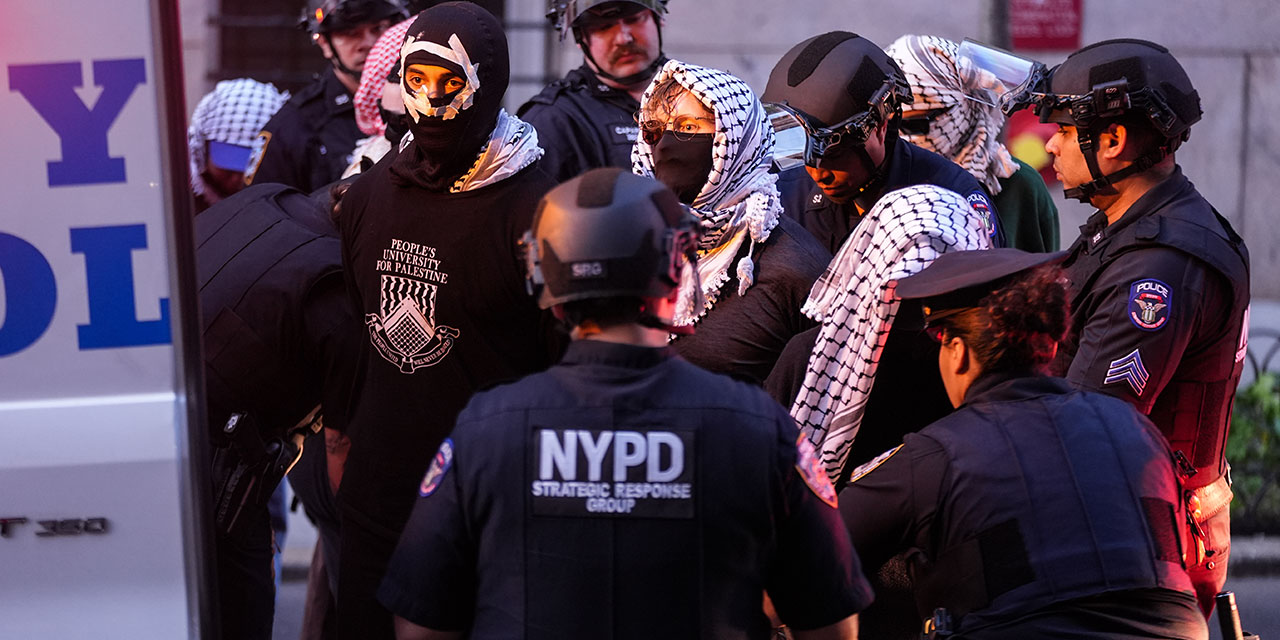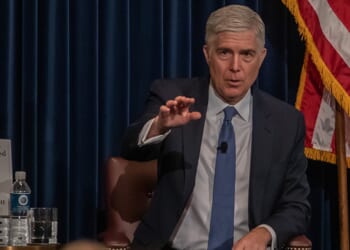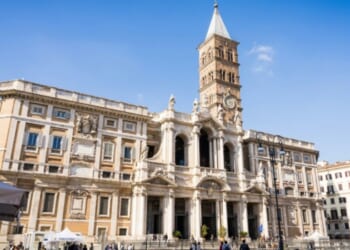
Charles Fain Lehman, Rafael Mangual, Renu Mukherjee, and Tal Fortgang discuss the latest Columbia University student protest, the Trump administration’s fight with Harvard, and highlights from the Manhattan Institute’s annual Alexander Hamilton Award Dinner.
Audio Transcript
Charles Fain Lehman: Live from New York and the Paulson Media Room at the Manhattan Institute.
This is the City Journal Podcast. I’m your host, Charles Fain Lehman, a fellow at the Manhattan Institute and senior editor of City Journal. Joining me on this very special live and in-person episode are my colleagues, Ralph Mangual, director of things, crime and criminality at the Manhattan Institute. Renu Mukherjee, responsible for educational things at the Manhattan Institute. And Tal Fortgang, legal all-around handyman at the Manhattan Institute.
How’s everyone doing today?
Rafael Mangual: We’re doing great. Surviving after a long night last night.
Tal Fotgang: We were on the front lines of civilization.
Charles Fain Lehman: That’s true. We were all protested viciously last night at the Manhattan Institute’s annual Alexander Hamilton Award Dinner, which was a great time. I discovered that my policies have been killing people for many years and supporting the evil billionaire class, which I feel great about.
Renu Mukherjee: We’re doing our job.
Rafael Mangual: Yeah, right? Nothing being called Nazi scumbag.
Renu Mukherjee: New York’s finest.
Charles Fain Lehman: Right, I want to jump into the other exciting protest news from last night. There was a takeover at Columbia Library that played out a little bit differently. I will admit that we were discussing this outside before we got started and Tal was in the know. So Tal, why don’t you tell our listeners, our viewers what the heck was going on at Columbia?
Tal Fortgang: Sure. Well, I was trying to catch up with the news in real time while, you know, preparing my tux for our gala, our billionaires telling us what to do gala. So scrolling through social media trying to piece together the different bits of evidence that you could induce. And it seems as though a group of several dozen students, possibly outsiders, interlopers at Columbia stormed the library, physically pushed past security. And some security seems to be injured or was certainly battered in some capacity. Took over the library while students were trying to study for finals and shouted with bull horns the usual disturbances, destroyed property, defaced property, and then the NYPD was called in. It’s not clear whether the mayor sent them. The NYPD went of its own accord. Columbia called them in. But one way or another, the police response seems to have been much swifter than some of the responses we’ve seen to takeovers at universities and particularly Columbia in the past. Students were told they had to produce ID and leave or face consequences. Some did, many more did not, and it seems as though there have been close to 100 arrests. The number I saw this morning was 70. I don’t really know precisely what that means. I don’t know if there have been arrests for non-students and other potential consequences for students and other affiliates of the university. But one way or another, there seems to be an attempt to identify the perpetrators, which has been a serious first step that has been lacking in previous responses. As far as I can tell, that’s where things stand. We got a great statement from the president. from Claire Shipman, she put out a very clean and clear statement discussing how unacceptable this is and what consequences there ought to be. We’ll see if she follows through.
Rafael Mangual: The NYPD also made it a point to Say on its social media platforms that it was responding to a request for its presence on the campus. So it does look like Columbia actually called in the cavalry on this one, which is exactly the right thing to do. I mean, you people are sick and tired of this you’re paying God knows how much per year for tuition room and board you want to access a nice quiet library to study for finals and finals are incredibly stressful time. I went to college a very long time ago but i still remember what that was like and you know the last thing you need is a bunch of lunatics screaming and banging drums and you know disturbing everything. So I want to see more of this. Not more of the protest, but to the extent that there are protests, I want to see more of the kind of swift response that we saw Columbia last night.
Renu Mukherjee: You even had Kathy Hochul release, I mean her her statement was somewhat more tempered down but even she released a statement on X saying, you know, she doesn’t reference Columbia, but she says, peaceful protest is fine. Violence, intimidation, harassment is not acceptable, and should face severe law enforcement.
Tal Fortgang: One thing that will be interesting to see is whether Columbia students try to form classes in litigation, try to file class action lawsuits against the students, the student groups, possibly Columbia itself for orchestrating and tolerating this stuff respectively. Because there is a kind of fundamental interference with the educational experience as it’s meant to be that this kind of event brings into stark relief. These are people who trying to study for finals. They’re at Columbia to try to get a degree, hopefully advance their economic prospects in the future, and for some people catapult them into the middle class, possibly for the first time. This is a serious part of the American dream that we’ve been sold on, and there are radicals actually interfering with their possibility of succeeding.
Rafael Mangual: Yeah, and it’s not just the educational pursuit, right? These people are paying for the ambiance for the experience, right? There’s a reason why you have these beautiful mahogany filled, know high ceiling libraries that they’re supposed that’s what that’s part of what you’re paying for what part of what you’re paying for are the amenities are the things that these protesters are making impossible to use and enjoy and that’s an interference with the contract that you have a real interest in seeing through. I mean you’re paying through the nose to be able to not just get taught things and not just have a place to study but to enjoy things in a particularly beautiful environment which is why they’re being targeted but that’s also you know why we should be viewing this as more than just interference with the intellectual pursuits that are going on, but also you know an interference with the very legitimate desire to take advantage, you know, of amenities that are baked into the tuition and the costs associated with attending that university.
Charles Fain Lehman: One of the things that interests me here, Fred Siegel, the former City Journal editor, contributor, great urbanist, scholar of the Giuliani revolution, in his work talks about what he first used the riot ideology. He talked about the riots in 1960s, 1960s, early 1970s, and the way in which municipal leaders responded to this was basically by saying rioting is a function of underlying causes, and so the more people riot, the more we need to provide them with resources, help them out, which of course creates… Yeah, right. Well, it creates an incentive to riot, right? It’s like if you riot, you’re going to get stuff, so why wouldn’t you riot more? This is the core of Siegel’s argument. What he argues is that eventually the Nixon administration gave authorization to stop tolerating the riots, and then they stopped happening. I think there’s a potential that we’re seeing something here where the Columbia administration sort of like not only tolerated but actively, sometimes actively celebrated, at least in the spirit of campus protests, campus occupations, campus willful law breaking for years. And now they’re just sort of going, well, actually never mind, we’re not going to put up with this anymore. So I guess my question is, I’m curious what people think, is that going to stick? And if so, is it going to work? Like was what was missing here just sort of deterrence and now that they have actually implemented some deterrence, is it going to have a meaningful impact?
Renu Mukherjee: I think it’s a bit of a mixed bag because you have the Columbia administration saying that they’re not tolerating this anymore or at least yesterday’s actions show they’re not going to tolerate it anymore. But even more so than the administration, the problem is the faculty. And you still have the faculty saying, there was a recent Free Beacon article in which this was at UChicago, not Columbia, but a professor canceled a midterm and this was in STEM. I forget what sort of mathematical course, but it was very complicated. It was STEM course, it wasn’t a humanities course. The professor canceled, actually now it’s finals time, the final and said instead go to this anti-Trump pro-Hamas protest because that matters more. And the student that leaked this to the Free Beacon said, kind of what Ralph was saying, “I’m paying to be here, I want to learn.” And so I think the administration is cracking down a bit more. That’s definitely because of, you know, the threat and, you know, the stick being shown with carrots and sticks by the Trump administration. But the rot is so deep with the faculty that they’re going to continue encouraging their students. Like, again, with this example from UChicago, it’s not just the humanities, it’s STEM professors that also feel like so, you know, the administration can take of Columbia and other institutions can take action. And I hope they do. But faculty got a faculty.
Rafael Mangual: I think that’s right. Look, I do think that these kinds of responses have a real deterrent effect. We actually saw a microcosm of this at the Manhattan Institute Gala last night, right? When the protesters first arrived at, you know, at Cipriani, they blocked the entrance and were very, very rowdy. NYPD had a great response, and they said, listen, you have to move from the sidewalk and the entrance, you have to clear a path, if you don’t do that, you’ll be arrested. They made a handful of arrests, guess what, everybody in, they backed up, and they made, so there is absolutely a deterrent effect in this. I don’t think people want to end up going to jail, facing consequences on campus, whether that’s expulsion or suspension, loss of privileges, whatever.
But that deterrent effect is short-lived. It requires a constant vigilance and a static willingness to bring those things to bear if and when these things occur. And what we don’t have is a guarantee that the next administration or after Trump leaves office, that these administrators are going to have the same kind of response that we saw last night. I think what we’re going to end up reverting back to is what we’ve been seeing at places like Harvard and Columbia.
Tal Fortgang: Yeah, I appreciate the focus on sort of the concrete manifestations of the corruption of the university and its subsequent cultivation of these radicals and inability to deal with it after it’s gotten out of hand. I think it all points to something more profound and more abstract. And the thing I keep coming back to is that we’ve heard over and over again over the last few years, like anti-Semitism, hatred of Jews, which is how this stuff often manifests on the surface, is really a reflection of a deeper civilizational sickness. And I think these universities are deeply sick in ways that you guys have described. Whether it’s the faculty, the administration, I mean, there are entire academic departments whose curricula are structured around conspiracy theories about how various people got to different parts of the world and who they really are.
And frankly, it’s not that different from what I heard on the subway on the way over, about how the white Jews are enslavers and fakers and we go to places where we don’t belong and we steal things from indigenous natives. This guy had the courtesy to grant the premise that I was a real Jew. Very nice, as he stood over me. And didn’t have the courage to swing his fist or anything like that. Thank God for small favors. But the point is that these universities have clearly forsaken their purpose as universities, and sure, that manifests at first as wild complaints about Zionists controlling God knows what. But that that merely reveals the deeper rock that’s underneath.
Renu Mukherjee: I also think just to really quickly add: arrest and discipline is not a deterrent when you have as a student been taught through high school, through your classes in college and you as a professor through decades in academia have come to believe that it’s a badge of honor, that, you know, you’re signaling that I care about these abstract causes. I care about, you know, I think of I think all these various groups, you know white men, Jews, you know conservative Asians all these like so-called bad groups are horrible. I’m living that practice by being arrested. It’s just, I think to that degree. Are we going to see less of this? I mean if you’re taught like that UChicago professor that you should go to a protest instead of taking my final and get arrested and then you’ve actually, you know lived your college education. I don’t think it’s going to be a deterrent of many students believe, you know that.
Rafael Mangual: There’s something to it, because we see that with, you know, even more established politicians, like, know, Jumaane Williams will show up and, so that they can be photographed. Exactly. So they can be photographed being walked off in handcuffs, right, so that they can say, I’m down with you guys, I’m for the cause, I’m, you know, it’s sort of a mark of authenticity.
Charles Fain Lehman: I think often about my, you know, progressive peers in college who, like, getting arrested was sort of like a fun activity. It was like a thing that you did. You were never going to get prosecuted for it. You were going to get slapped in handcuffs, and then you were going to sit in the cell for a couple hours. And you were going to get noticed to appear. The prosecutor was just inclined to do so. I know a half dozen people who were like, oh, she got arrested today. She’s very brave. No, of course she’s not. She’s entirely coordinated.
Renu Mukherjee: Then you’re going to write your Ivy League law school application essay about how you got arrested. And you’re going to get in. The cycle just keeps on going.
Charles Fain Lehman: There’s a there’s a certain, Goodhart’s law is, “any measure that becomes a target ceases to be a useful measure.” There’s a certain Goodhart’s law character to it. It’s like, once you can use getting arrested to your personal advantage, it’s no longer a signal. I want to take this out, so I want to ask people. I think the campus radicalism waxed and waned over the course of the 20th century, of emerged in the early and mid-1960s, get the history there, rises through the 70s. There is sort of a backtrack through the 80s, up and down to the 90s and 2000s. So I mean, this stuff comes and goes with its popularity and its influence. But I want to ask, are we at a local peak? Is this a sign that we’re like, it’s going to go down, we’re going go back to quiet, or is this just the calm before the storm? Tal, what do you think?
Tal Fortgang: I think a lot rides on how these specific university administrators decide to handle these specific incidents. It will turn out to be a peak if Claire Shipman follows through on the strong statement she put out. If there are actual expulsions for students, arrests and prosecutions for people who trespass from the outside, then it may be, but nothing is forordained.
Rafael Mangual: Yeah, I think we’re in a state in which things are going to ebb and flow on college campuses. It’s going to be responsive to what’s going on in the world, what’s going on in the country. If there’s another George Floyd, if there’s another 10-7, I think we’ll see the next peak. And then things will calm down in between controversies. But I think this is going to be sort of a constant part of the campus culture for the next 20 years at least.
Renu Mukherjee: Yeah, I agree with both Ralph and Tal on this. I think a lot is also going to have to do with the local governance of the states, the cities in which these universities are located. So I think like the New York, I think the mayoral election is going to be very telling about the way in which, know, Columbia is going to be handled in the coming months, years, etc. And then I also think, you know, with respect to Harvard, for example, I mean, Harvard has basically said we’re going to stand up to the Trump administration, we’re going to stand up to other conservatives, we’re not going to go along with any of this, it seems like a lot of other universities are similarly defiant and are using Harvard as their North Star. And so in that case, I don’t necessarily think we peaked.
Charles Fain Lehman: We’re to talk about Harvard in a second. So that’s a good segue. I will say that the politics point is salient, too. The guy I think about here always is, I just got his name wrong, S. I. Hayakawa. Hiawaka or Hayakawa? I never remember, who was the president of UCSF when the campus was shut down for five months by protesters in 71, 72. This is, the way, where the first African-American Studies Department comes from. It’s out of the fruits of this occupation by the Third World Liberation Front. He went on to be elected to the US Senate because he was viciously anti-protester. And the people of California were like, yes, we want you in the Senate. Then he goes on to the English is National Language Advocacy Campaign. Fascinating figure.
But the question is like, do the people reward it? Like what is Andrew Cuomo saying about this? And are the voters going to look at it go, we talk about Zohran Mamdani on this show a lot. I’m sure Zohran Mamdani would have liked to have gotten arrested with these guys too. I’m sure he regrets not being up there. Is he going to get rewarded for that? That’s I think the bigger potential signal.
That’s a pretty good segue. Moving back into what is apparently a higher education focused episode. That’s OK. Everyone here has got opinions. And we’ve talked about this before, actually, with you guys. I want to draw our attention to the other higher ed story in the discourse right now, which is the letter from Secretary of Education Linda McMahon to Harvard informing them in, I don’t know, distinctively Trumpian style that the federal government will not be issuing grants to Harvard going forward, citing, among other things, the research done by, the reporting done by City Journal’s Chris Rufo on the Claudine Gay plagiarism scandal. So that’s nice. But it’s yet another move in this like back and forth. Tell them, you guys had a, I think a back and forth on the podcast about this a couple of weeks ago with a question, you you’ve been pretty skeptical of their effort to draw back sort of current funding, how do you feel about saying no more, the pipe is dry?
Tal Fortgang: Well there’s nothing inherently wrong with it, just as there’s nothing inherently wrong with sending official Department of Education letters that have certain words in all caps. They’re kind of similar in the sense that if you execute your plan haphazardly, it’s going to blow up in your face. Nothing is legally stopping the federal government from not renewing its contracts, whether for grants or other matters, with any institution of higher learning. There’s nothing stopping the federal government from attaching new strings to higher education, which may be a more effective use of its taxing and spending power.
Which is to say, it can dangle funding as a carrot and say you have to maybe take certain Supreme Court decisions about colorblind meritocracy seriously if you want to continue receiving our support. If you do it haphazardly, if you show animus, if you act in ways that appear arbitrary and capricious, you are setting yourself up for failure in court. And I just see that as an unforced error when it comes up.
Rafael Mangual: Yeah, I look, I don’t think that they’re really facing a serious legal challenge with respect to future funding, right? I don’t think that they can be compelled into a perpetual relationship with Harvard for all time. And so the government’s absolutely free to do that. How effective do I think it will be? Not very, right? Harvard has a $53 billion endowment. All they really have to do is wait out the next four years. If J.D. Vance wins in ‘28 and decides to keep this up, maybe another four years, they can certainly afford to do that.
But what I think is really going on here is just we’re missing out on the sort of deeper level conversation that’s really driving this animus that’s driving the wedge between an institution like Harvard and an administration like this one. And that is that the administration is trying to give voice to a segment of the American public that is kind of sick and tired of having the finger wagged at them for not being good enough. It’s like, OK, well, we have to give billions and billions of dollars to an institution that would never touch me or my kids or grandkids with a ten-foot pole because we didn’t come from. You know, whatever town in Massachusetts or, you know, weren’t born with a silver spoon and, you know, on top of that, like, you know, Harvard could get away with the elitism and the smugness back when it was actually doing things and producing things and it could, you know, make claim to an objective set of criteria for who gets in and you felt like, oh, somebody went to Harvard, they must really know what they’re doing. That’s not the case anymore.
Tal Fortgang: Charles would never say that.
Charles Fain Lehman: It’s America’s premier institution of lower education.
Rafael Mangual: You know, but that’s just not the case anymore, right? I mean, I Americans now understand Harvard to be the, you know, a kind of boot camp for anti-Americans in the future. You know, it’s a place where people go to learn how to hate middle America better. You know, I think that’s the sense, you know, so it’s not at all surprising that someone who spoke the way that Trump did on the campaign trail is trying to make good on the promise to continue to send that kind of signal.
Is it clumsy? Yes. Is it ultimately not going to have any real lasting effect? I don’t think it will. Like I said, Harvard’s a very rich institution, which is also one of the reasons why the public is behind Trump on this one, I think, at least in terms of just the public sentiment. Is it an unforced error? I don’t think I would go that far.I think it’s probably just a signaling device that is going to lack effect in the long run. But ultimately it’s, you know, the byproduct of a deeper issue.
Charles Fain Lehman: Yeah, want to. And I’m going to want Renu’s thoughts on this because there’s a bigger picture. Let’s say that’s true. There is still sort of a recentering of priority power, et cetera. We ran a piece yesterday from frequent peer, frequent panelists on this podcast, Jesse Arm, talking at the movement of Michigan’s president, Santa Ono to the of Florida making the argument that basically the future in higher education is in the south. We’re running a piece at City General probably tomorrow about how red state universities stand to gain from the displacement of popularity of the ivies that you can really imagine people sort of in their academic careers flowing to these other institutions because they don’t want to be at public enemy number one. So I’m curious, Renu, in particular, but also everybody else. Let’s say this is the durable state of affairs. Play the tape forward five years. What happens? What are the effects of Harvard taking its ball and going home, the federal government taking its ball and going home with regards to Harvard?
Renu Mukherjee: What I find interesting is, know, who knows how this will play out in court, but on a cultural and a philosophical level, this is very fascinating. So when I think about the Wall Street Journal had a piece many months ago about the SEC schools and about how many students, of course, they profiled students that wanted to go to universities that are still interested in teaching, particularly in the STEM field. So they interviewed students who wanted to go into engineering and felt as though they couldn’t necessarily get that type of education without the noise of leftism at Harvard, and so I’m going to go to Georgia Tech. But they also interviewed students that just wanted good old fashioned American college, know, what the movies have depicted, which you just cannot get at Harvard, you cannot get at Columbia or even the smaller, you know, sort of New England schools, Williams, Colgate, et cetera, anymore. And so I think on a cultural level, the Ivies becoming sort of bastions of leftism, of, you know, anti-Semitism, is going to drive a lot of real really interesting candidates to the South that don’t just want to learn, but want like this quintessential American experience.
I think the second part of that in terms of philosophically and know, Jesse’s great piece in CJ yesterday about how you have academics, you have university professors that are moving to these SEC schools, other schools in the South, know, Big Ten schools, is that they are interested primarily in running an institution that is going to educate students well, you know, that is creating a great place to just simply be and is doing the job of the university, which has always been the production and dissemination of knowledge. The issue philosophically at the Ivies and where I think they’re going to continue struggling, and other highly selective schools is, and you see this a lot in amicus briefs and other legal filings and students for fair admissions and now in letters sent in response to the Trump administration, it’s very much you owe us a level of deference. You cannot tell us what to do because along with what Ralph was saying, know, we’re so superior to you. We know what’s best. And even if we’re discriminating racially or, you know, we’re harassing our Jewish students, there’s a higher purpose and you just need to trust us. So I think for those two reasons, you know, yeah, Southern schools, SEC schools, Big Ten schools, like they’re going to gain a lot both philosophically with talent from professors and then also culturally from like really great students.
Rafael Mangual: I think you’re exactly right about the cultural cache, as you were speaking the image that came right into my mind. I think it was in North Carolina where the like group of frat boys protected the American flag from being torn down from a flag. And it’s like, you could never imagine Harvard students doing that. That’s what people, I think, are really getting animated about. They’ve come to that conclusion. And there’s still a lot of patriotism in this country. it’s like, you love America, if you love the ideas of the founding, if you are even remotely to the right of Mao, the South is actually a pretty attractive place for you to go to school.
Tal Fortgang: So it raises the question that I get so frequently, I’m sure, I’m sure you get this question all the time, why do you care so much about universities? And there are a few different ways this is framed, either like, it’s just the ivory tower. It’s just one small sector of the economy. They’re just kids. Who cares what kooky professors are saying?
Whatever it is, being an incubator of anti-American, anti-Western sentiment matters. The proliferation of a generation of people trained as a matter of taste to dislike the West and prefer its enemies. That stuff is, that is the foundation of a revolution. And for those of us who prefer reform to revolution, you don’t have to be incredibly conservative. Some of us are just, you know, categorically against reform…
Charles Fain Lehman: Got to go back.
Tal Fortgang: Return with a V in middle.
Charles Fain Lehman: Reform is too revolutionary for me.
Tal Fortgang: That is actually something to be concerned about on a civilizational level. It’s not really about the universities. And the truth is, Iran recognizes this. China recognizes this. And that’s beyond stealing our research and our procedures. And there was an amazing whistleblower piece out of the Stanford Review, I I can’t remember.
Renu Mukherjee: Yesterday, yes.
Tal Fortgang: I haven’t had a chance to really review, no pun intended, carefully. I mean, there’s a lot of foreign attention paid to our campuses because our enemies see that as our weak spot and we should start learning to think about things from their point of view. Why are they so invested in this? Maybe we should take that seriously. Renu Mukherjee” And then also, Tal, your point, it’s, progressives have been saying this about universities for a long time in that, for example, one of the main arguments in favor of race-conscious admissions, affirmative action, particularly for the highly selective universities, which is really the only area in which this matters, is that students who go to these highly selective schools are then the elite in American society and in turn shape American society. And that’s why, you know, we should have racial preferences because we need diversity. But to your point, Tal, we can also use that argument. You know, we should care about, you know, what Harvard is teaching and what Harvard’s incoming classes look like because these are the people that are going to be governing us, that are going to be responsible for financial institutions, other elite universities, and in a way, it’s kind of like taking progressives have seen this for a long time coming. We haven’t always paid attention.
Rafael Mangual: These people, these are also people are going to be deferred to in their communities because of their credentials. These are people going to be preferred in their educational pursuits in their career pursuits because of that credential, which is why I do think that there’s something to what the Trump administration is trying to do, which is To denigrate the credential a little bit and to remind people that you know, it’s no longer the signal that it used to be. You can now flip a coin and just two people have Harvard degrees, you can flip a coin and one of them might be good and sane, we have many of them here at the Manhattan Institute.
Charles Fain Lehman: We have all the good ones.
Rafael Mangual: But unfortunately, it’s no longer a guarantee of really anything.
Tal Fortgang: The migration to the South is a very salutary development though because nothing erodes the credibility of desiccated but still vestigially prestigious institutions like actual talent going elsewhere. And I think, you know, I think there is a, to your national security point, there is an argument that if you cannot rely on the sort of superstar institutions, you need to diversify your portfolio of talent generators. The school that I’m my eyes on, a number of schools, but Vanderbilt is really interesting to me. I had a conversation with somebody there who pointed out they’re top of the list, both the ADL’s list of best schools for dealing with anti-semitism and FIRE’s list for best schools for free speech, which is like a hard tight rope to walk and they’re doing it successfully. It’s also a good school. Yeah, it’s a very good school.
Renu Mukherjee: The Harvard of the South, that’s what he’s saying.
Rafael Mangual: It reminds me of Justice Thomas and his, you know, he was very public a few years back about wanting to diversify the ranks of the Supreme Court clerks and made it a point to say, I’m going to hire clerks from non-T14 law schools. I think this has been bubbling up for a long time. It’s coming to a head because Trump has no filter. He’s who he is. But no, I think that people have been slowly recognizing this for the last 20 years. And unfortunately, Harvard, Columbia, all of these schools, even Princeton, have been making it a point to almost say like yeah, you’re right, we are disgustingly elite, and we do inculcate these values, and they take pride in the sort of social justice posture. It’s only a matter of time until the vast majority of Americans who don’t buy into any of that stuff have had enough.
Charles Fain Lehman: Yeah, so I want to take, let me ask the almost million-dollar question at this point to take us out. If you had the opportunity, would you send a child to Harvard? Like you got, I’m going to send my kid to my own kids school in 14 years, so who knows what it’s going to look like then but like right now would you do it? Ralph?
Rafael Mangual: Only if I could quit my job and make sure that I could undo everything.
Tal Fortgang: I thought that was your job.
Rafael Mangual: I would obviously want my kid to be educated in a great place, to be surrounded by high performing individuals, but I think ultimately I would rather my kid go to a place like Hillsdale or even this new University of Austin, which I’m completely fascinated by. I want to learn so much more about what they’re doing. But no, yeah, it would no longer be the source of pride that I think it would have been if you had asked me this question 20 years ago.
Renu Mukherjee: So my husband and I actually talk about this a lot. It’s like a fun thought experiment for us. And I think like where I would come down is there are other highly selective schools that have both the credential but also better values, I think, that align more with America’s actual first principles. And they’re like, for example, if you look at some of the Catholic colleges, like Notre Dame, I would love to send my kid to Notre Dame, one of the service academies. I think those combine the prestige that Harvard has without a lot of the leftist craziness. So I think that that’s where I would turn.
Tal Fortgang: Yeah, this is the kind of question that comes up all the time at Shabbat tables and there’s obviously a slightly different angle for those of us who wear yarmulkes and hope our kids will feel secure and proud enough to do the same by the time they get to this stage in their lives. And just thinking broadly about what advances the welfare of Jewish Americans and I think that that’s aligned with the welfare of the United States of America as a nation.
There is a lot more we could do even in the realm of credentialing, rather than going to college altogether. I mean, my wife, bless her creative heart, says things like, why are we not sending our best and brightest to culinary school? We could have amazing kosher restaurants around the country.
Rafael Mangual: Without the politics of Jose Andres.
Tal Fortgang: Exactly. Not to mention just like…
Charles Fain Lehman: There’s no good kosher food outside of New York. It’s a real problem.
Tal Fortgang: You haven’t been to South Florida recently, my friend. Now it’s incredibly expensive to operate a kosher restaurant, Having a kosher restaurant is not the most important thing for an observant Jewish community, but it’s important. If we can’t spread out and start new institutions and new places with people who are capable of stewarding those institutions… This is a broader point. Then we’re going to continue clustering in areas that are traditional for us, that are expensive, that give us great Jewish leaders like Jerry Nadler and Chuck Schumer, who clearly are doing wonders, you know, looking out for their community. And sorry for making this so particularistic, but it is a particularistic concern. We should be branching out and thinking more broadly about how the next generation can live more fulfilling lives while advancing a noble and patriotic cause.
Rafael Mangual: Is there a risk though? I was just, as all of us are talking, I’m just thinking about like, if we all had our kids abandon these places, then they fall.
Charles Fain Lehman: There’s a cooperation game problem.
Rafael Mangual: There’s no one there to defend about it. I’m just thinking back to Utah. I don’t know if you remember this, but when you were a freshman at Princeton, you wrote an op-ed in the student paper on white privilege.
Tal Fortgang: That I remember, yeah.
Charles Fain Lehman: That’s like how he got this job basically.
Rafael Mangual: I had just started here. was like around 2015, 2016. couldn’t have been, you know, 2014. Yeah. And I had just started here. And I said I sent him, I think it was a note on Twitter. And I was just like, this is exactly what these places need. Good on you for standing up. And I hope you come into the world of public policy one day. Now we’re colleagues. I don’t know if you remember that. But I remember from being an outsider feeling proud, like, OK, these institutions are going to be OK. We still have people there who are like that.
Charles Fain Lehman: Yeah, I mean, think I would never send a child to Harvard because Harvard sucks. You know, I went to an elite school and found my way into, found my way into sort of the right-wing scene at that school 50 percent by luck. And that was very beneficial for me. Turned me into a crazy person, but that was going to happen regardless. It’s going be a good kind of crazy person. And I think that there was that institutional structure was very valuable for me. That said, you know, would I want my kid to take that path? It’s a pretty big individual risk. I would like to have the kind of kid who could go back and get the kind of experience that I had and benefit from it and then go on to sort of share my values and have positive impact. I’m not sure I want to make that bet. Right. I’m not sure. I’m not sure I want to.
Tal Fortgang: I don’t know how much agitators from the inside can really change the institution. Certainly students, I mean, maybe at best I was able to be an advocate for the cause among a few people who were open to being persuaded. I’m not so hopeful that there are so many people who are dedicated to it that can really, that there’s like a, there’s a critical mass of such people.
Charles Fain Lehman: I had a conversation with somebody who runs a right of center Catholic org that’s adjacent to Yale’s campus, not actually Yale affiliated. And I said to him, look, I don’t need you to win the campus wars. I need you to find me the 10 pecent of Yale students who are aligned and who are interested and who are smart. I need you to give them to me. Like, because what happens on their campus actually doesn’t matter that much. What matters is what they then go on to do afterwards. So I want that pipeline. I want that available. But maybe you get it somewhere else.
I want to take us to a lighter note before we can run out of time.
Last night, as I mentioned earlier, we were all here for MI’s annual Alexander Hamilton Awards dinner. We honored our now-former board chairman, Paul Singer, to whom we’re always very appreciative. And everyone in the great star-studded gala, I got to put on my tux. So before we go, I want to ask everyone, what was your highlight of last night? Yeah, let’s start with Ralph.
Rafael Mangual: Wow. A lot of highs. Yeah, a lot of high. The protesters were hilarious. Getting to meet Daniel Penny was up there.
Charles Fain Lehman: He was there?
Rafael Mangual: He was there.
Charles Fain Lehman: In the flesh?
Rafael Mangual: What that kid has been through, his willingness to stand up in that moment, and the kind of fortitude that he showed throughout his prosecution. I think he’s an admirable figure. And so it was an honor to get a chance to talk with him. He was a very popular person in the room, as he should be.
Charles Fain Lehman: There were a lot of ladies around him.
Rafael Mangual: Yeah, but glad to see that he’s doing well and that he’s readjusting to normal life after the trial so that was up there.
Charles Fain Lehman: Renu, you’re not allowed to say meeting Daniel Penny. That one’s been taken.
Renu Mukherjee: No, I have a bit of a, I’ll make it quick, but a bit of a wild story. So I sat next to Ilan Wurman, who’s now an adjunct fellow at MI, a brilliant constitutional lawyer, thinker, talent. And I was starstruck because back in 2018, he came and spoke to one of my political science classes at Holy Cross and he signed a, he had just released a book, A Debt Against the Living. He had signed my copy of that book and he was close with my professor of this class at the time who has gone on to become a mentor and friend of mine. He was at my wedding two weeks ago and so when Ilan introduced himself to me, I said, not to be weird, but I met you many years ago. We have the same friend and mentor and I just can’t believe you’re sitting next to me right now.
So shout out to the events team, for you know, putting me at the best table ever.
Charles Fain Lehman: Nice, Tal?
Tal Fortgang: It is like you go to these events when you’re in, you’re part of the MI universe and it’s like celebrity, micro-celebrity sightings around every corner. I feel the same way around.
Charles Fain Lehman: Elise Stefanik
Tal Fortgang: Well that’s, you know, she’s gotten some good airtime recently. I mean like, I had a conversation with a vaunted editor from one of the prestige publications in kind of our realm. This editor happens to have a particular way of accepting or rejecting your pieces. The language is always very precise. And I worked up the courage with the help of a few Scotch whiskies. If he could show me how he actually physically executes this process. Does he have a shortcut where he presses one button and his trademark rejection is sent out? And he said “no, but it’s close to that” and he showed me the predictive typing on his phone that he just taps the same button five times.
Charles Fain Lehman: I have to start doing this.
Tal Fortgang: He goes, your last piece, your last submission has been rejected twice now. Which is a humbling thing. But you know, you meet your heroes, you never know what you might learn from them.
Charles Fain Lehman: I’ve learned a very useful skill for rejecting Tal’s submissions going forward.
Tal Fortgang: You didn’t need any help with that.
Tal Fortgang: My highlight of the evening was, course, communicating with the Donors, everything great thing that we’ve been doing with the Manhattan Institute, and of course highlighting what comes next, most importantly, the City Journal Podcast. On that note, that’s about all the time that we have today. Thank you as always to our panelists. Thank you to our producer, Isabella Redjai, who’s somewhere around here.
Listeners, if you enjoyed this very special live and in-person episode, or even if you didn’t, please like, comment, subscribe, do all the buttons that you can click available in front of you on YouTube or whatever platform you’re listening to us on. Maybe leave us a question. Maybe sometime we’ll answer it. We haven’t gotten any good ones yet. So please consider doing it. That’s about all the time that we have and so until next time you’ve been listening to the City Journal Podcast. I hope you’ll join us again soon
Photo by Lokman Vural Elibol/Anadolu via Getty Images















